- Forum
- categories
- Markets, finance and governance
- Sanitation as a business and business models
- Progress so far ... Sanitation Service Delivery Program (PSI with PATH and WSUP, funded by USAID) - Ghana, Ivory Coast and Benin
Progress so far ... Sanitation Service Delivery Program (PSI with PATH and WSUP, funded by USAID) - Ghana, Ivory Coast and Benin
258k views
- USAIDssd
-
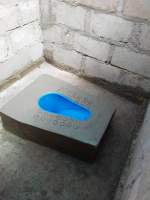
- SSD is a sanitation program funded by USAID, which aims to create sustainable sanitation market for the urban poor in Benin and Côte d'Ivoire. This market will elicit a demand for sanitation services and a reliable supply of high-quality sanitation products and services.
Less- Posts: 50
- Karma: 1
- Likes received: 9
Re: Progress so far ... Sanitation Service Delivery Program (PSI with PATH and WSUP, funded by USAID) - Ghana, Ivory Coast and Benin
Un atelier de capitalisation du projet de prestation de services d’assainissement
entre les mairies et les microentreprises de leur localités dans la mise en
œuvre du projet SSD, s’est tenu dans afin d’atteindre les objectifs suivants :
Cet atelier avait pour objectifs spécifiques :
Faire un bref bilan de ce qui a été fait du projet SSD;
Prendre en compte les observations sur les imperfections constatées
Mettre en place un plan d’action de pérennisation du projet SSD dans chacune des communes concernées
Il convient de souligner que cet atelier s’est fait sous la présence effective de Mme la Représentante Résidente
de PSI, Mme Fedra Marie BAPTISTE et du Chief Of Party du projet SSD, Mr Salifou
COMPAORE.
Mais aussi des partenaires du projet SSD, tels que :
- La Direction de l’Assainissement en milieu Rural (DAR) avec l’intervention Mr le sous-directeur de la DAR qui a
présenté les besoins en assainissement de quelques localités de Côte d’Ivoire.
- L’entreprise SIG, prestataire intervenant dans l’approvisionnement des TPE en SATOPAN a intervenu sur le mécanisme de
livraison et les recommandations, après septembre 2021
- Le prestataire TAJPLAST quia intervenu sur l’approvisionnement du dispositif de lavage des mains (DLM), définissant les objectifs et mode du
fonctionnement du partenariat entre TAJPLAST et les TPE, le mécanisme de
livraison et les recommandations pour l’après septembre 2021.
Outre les points éminents de l’atelier tels que : la présentation des structures et objectifs clés des
partenaires en rapport aux actions mises en œuvres dans le projet SSD et leurs perspectives
de même la prise de contact des TPE avec les Mairies et les partenaires ;
nous avons assisté à la remise de tricycle de Mme la Représentante résidente de
PSI-CI après son allocution sur les encouragements et remerciements des
participant à cet atelier, puis celle du Chief Of Party du projet SSD, Mr
Salifou COMPAORE, sur les objectifs et les perspectives du challenge dans la
mise en œuvre du projet SSD aux niveaux des TPE.
De ce fait le Lauréat de TPE BALDE de Bouaké, s’est vu récompensé d’un tricycle.
+++++++++
Translation by Deepl added by moderator:
A workshop to capitalise on the sanitation service provision project
between the town halls and the microenterprises of their localities in the implementation of the SSD project
The workshop was held in order to achieve the following objectives:
The specific objectives of the workshop were to
To make a brief assessment of what has been done with the SSD project;
To take into account the observations on the imperfections observed
To put in place an action plan for the sustainability of the SSD project in each of the communes concerned
It should be noted that this workshop was held in the presence of the PSI Resident Representative, Ms. Fedra Marie
representative of PSI, Mrs. Fedra Marie BAPTISTE and the Chief Of Party of the SSD project, Mr. Salifou
COMPAORE.
But also the partners of the SSD project, such as
- The Direction de l'Assainissement en milieu rural (DAR) with the intervention of the deputy director of the DAR who
presented the sanitation needs of some localities in Côte d'Ivoire.
- The SIG company, a service provider involved in the supply of SATOPAN to the MSEs, spoke about the delivery mechanism and the recommendations, after September 20.
delivery mechanism and recommendations, after September 2021
- The service provider TAJPLAST, which intervened on the supply of the hand washing device (DLM), defining the objectives and mode of
of the partnership between TAJPLAST and the MSEs, the delivery mechanism and
delivery mechanism and recommendations for post September 2021.
In addition to the highlights of the workshop such as: presentation of the key structures and objectives of the
of the partners in relation to the actions implemented in the SSD project and their perspectives
as well as the contact of the MSEs with the town halls and partners;
we attended the handing over of the tricycle by the Resident Representative of
representative of PSI-CI after her speech on the encouragement and thanks of the
participants in this workshop, then the Chief of Party of the SSD project, Mr. Salifou
Salifou COMPAORE, on the objectives and perspectives of the challenge in the implementation of the
implementation of the SSD project at the MSE level.
As a result, the winner from TPE BALDE of Bouaké was awarded a tricycle.
entre les mairies et les microentreprises de leur localités dans la mise en
œuvre du projet SSD, s’est tenu dans afin d’atteindre les objectifs suivants :
Cet atelier avait pour objectifs spécifiques :
Faire un bref bilan de ce qui a été fait du projet SSD;
Prendre en compte les observations sur les imperfections constatées
Mettre en place un plan d’action de pérennisation du projet SSD dans chacune des communes concernées
Il convient de souligner que cet atelier s’est fait sous la présence effective de Mme la Représentante Résidente
de PSI, Mme Fedra Marie BAPTISTE et du Chief Of Party du projet SSD, Mr Salifou
COMPAORE.
Mais aussi des partenaires du projet SSD, tels que :
- La Direction de l’Assainissement en milieu Rural (DAR) avec l’intervention Mr le sous-directeur de la DAR qui a
présenté les besoins en assainissement de quelques localités de Côte d’Ivoire.
- L’entreprise SIG, prestataire intervenant dans l’approvisionnement des TPE en SATOPAN a intervenu sur le mécanisme de
livraison et les recommandations, après septembre 2021
- Le prestataire TAJPLAST quia intervenu sur l’approvisionnement du dispositif de lavage des mains (DLM), définissant les objectifs et mode du
fonctionnement du partenariat entre TAJPLAST et les TPE, le mécanisme de
livraison et les recommandations pour l’après septembre 2021.
Outre les points éminents de l’atelier tels que : la présentation des structures et objectifs clés des
partenaires en rapport aux actions mises en œuvres dans le projet SSD et leurs perspectives
de même la prise de contact des TPE avec les Mairies et les partenaires ;
nous avons assisté à la remise de tricycle de Mme la Représentante résidente de
PSI-CI après son allocution sur les encouragements et remerciements des
participant à cet atelier, puis celle du Chief Of Party du projet SSD, Mr
Salifou COMPAORE, sur les objectifs et les perspectives du challenge dans la
mise en œuvre du projet SSD aux niveaux des TPE.
De ce fait le Lauréat de TPE BALDE de Bouaké, s’est vu récompensé d’un tricycle.
+++++++++
Translation by Deepl added by moderator:
A workshop to capitalise on the sanitation service provision project
between the town halls and the microenterprises of their localities in the implementation of the SSD project
The workshop was held in order to achieve the following objectives:
The specific objectives of the workshop were to
To make a brief assessment of what has been done with the SSD project;
To take into account the observations on the imperfections observed
To put in place an action plan for the sustainability of the SSD project in each of the communes concerned
It should be noted that this workshop was held in the presence of the PSI Resident Representative, Ms. Fedra Marie
representative of PSI, Mrs. Fedra Marie BAPTISTE and the Chief Of Party of the SSD project, Mr. Salifou
COMPAORE.
But also the partners of the SSD project, such as
- The Direction de l'Assainissement en milieu rural (DAR) with the intervention of the deputy director of the DAR who
presented the sanitation needs of some localities in Côte d'Ivoire.
- The SIG company, a service provider involved in the supply of SATOPAN to the MSEs, spoke about the delivery mechanism and the recommendations, after September 20.
delivery mechanism and recommendations, after September 2021
- The service provider TAJPLAST, which intervened on the supply of the hand washing device (DLM), defining the objectives and mode of
of the partnership between TAJPLAST and the MSEs, the delivery mechanism and
delivery mechanism and recommendations for post September 2021.
In addition to the highlights of the workshop such as: presentation of the key structures and objectives of the
of the partners in relation to the actions implemented in the SSD project and their perspectives
as well as the contact of the MSEs with the town halls and partners;
we attended the handing over of the tricycle by the Resident Representative of
representative of PSI-CI after her speech on the encouragement and thanks of the
participants in this workshop, then the Chief of Party of the SSD project, Mr. Salifou
Salifou COMPAORE, on the objectives and perspectives of the challenge in the implementation of the
implementation of the SSD project at the MSE level.
As a result, the winner from TPE BALDE of Bouaké was awarded a tricycle.
Learning and Communication Manager SSD|PSI Côte d’Ivoire
Attachments:
-
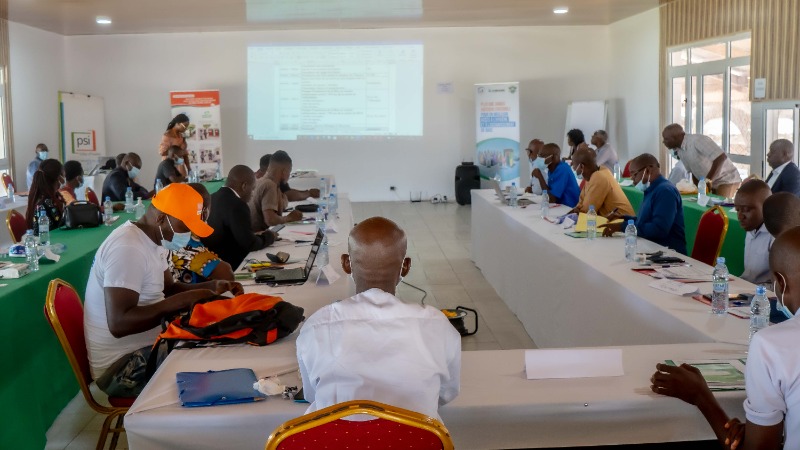 ORC00062.jpg
(Filesize: 134KB)
ORC00062.jpg
(Filesize: 134KB)
-
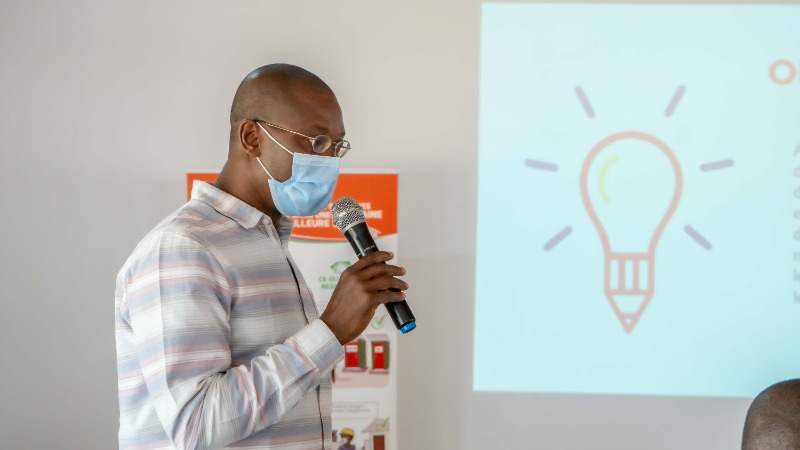 ORC00065.jpg
(Filesize: 78KB)
ORC00065.jpg
(Filesize: 78KB)
-
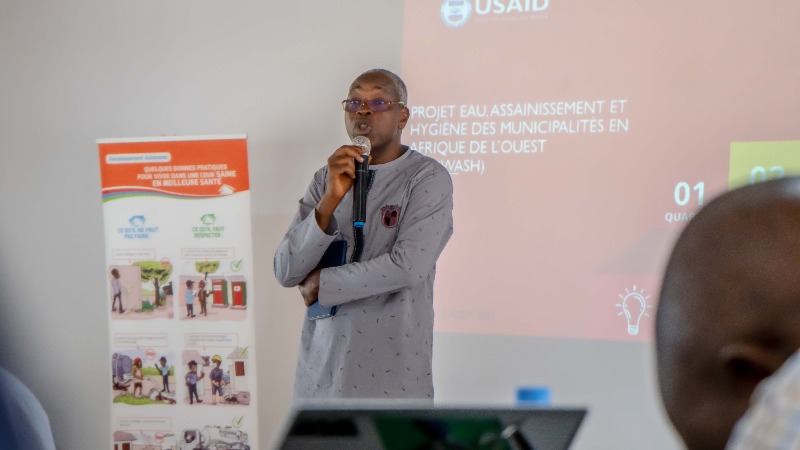 ORC00151.jpg
(Filesize: 88KB)
ORC00151.jpg
(Filesize: 88KB)
-
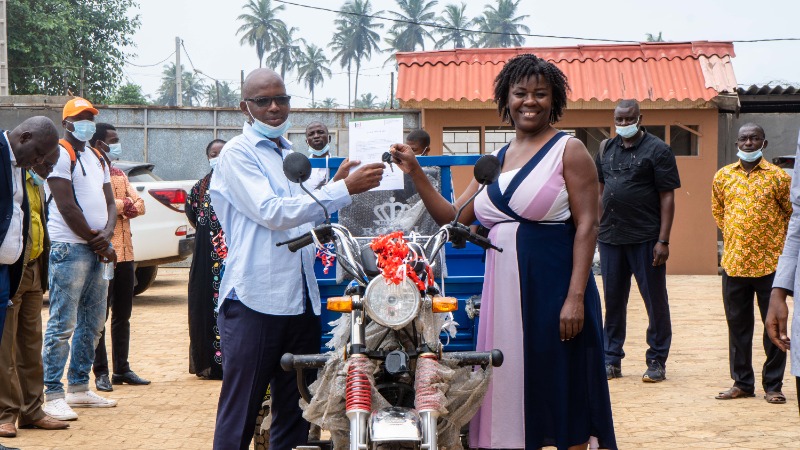 ORC00220.jpg
(Filesize: 204KB)
ORC00220.jpg
(Filesize: 204KB)
-
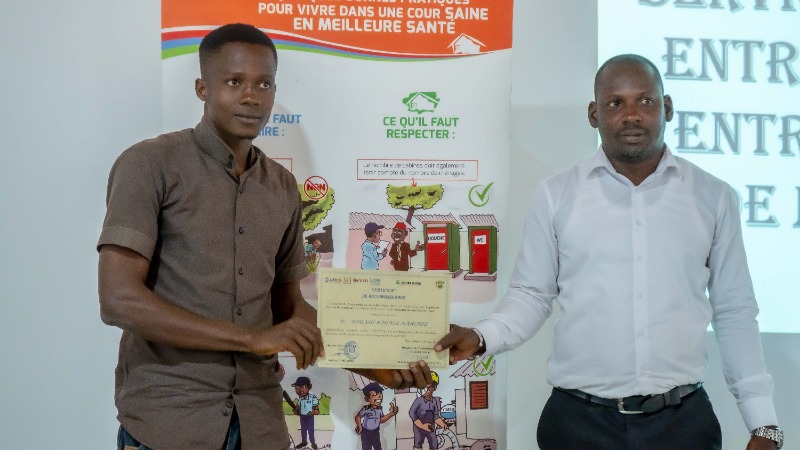 ORC00301.jpg
(Filesize: 128KB)
ORC00301.jpg
(Filesize: 128KB)
-
 ORC00225.jpg
(Filesize: 214KB)
ORC00225.jpg
(Filesize: 214KB)
Please Log in to join the conversation.
You need to login to reply- USAIDssd
-

- SSD is a sanitation program funded by USAID, which aims to create sustainable sanitation market for the urban poor in Benin and Côte d'Ivoire. This market will elicit a demand for sanitation services and a reliable supply of high-quality sanitation products and services.
Less- Posts: 50
- Karma: 1
- Likes received: 9
- Accroître l’accès à l’assainissement de base ;
- Renforcer l’accès au service de gestion sécurisée des boues de vidange
- Partager les leçons apprises et meilleures pratiques à travers l’Afrique de l’Ouest ;
sont les objectifs majeurs du projet Sanitation Service Delivery (SSD) ou projet de Prestation de Service d’Assainissement financé par l’Agence des Etats-Unis pour le développement international (USAID) exécuté au Bénin, en Côte d’Ivoire par Population Services International (PSI), et au Ghana par
Water and Sanitation for the Urban Poor (WSUP). Un financement à hauteur de 19,9
millions de dollars avec pour vision de catalyser le marché de l’assainissement
et accroître la capacité du secteur privé à fournir des services
d’assainissement à des coûts abordables aux populations urbaines à faible
revenu.
L’occasion solennelle fut donnée le jeudi 16 Septembre 2021 à l’hôtel GOLDEN PALACE de GRAND-Bassam, en présence du ministre de l’Assainissement et de la Salubrité, Bouaké Fofana, et de l’Ambassadeur des
Etats-Unis en Côte d’Ivoire, S.E Richard K. Bell et de tous les acteurs et
partenaires du projet lors de la cérémonie de clôture l’information officielle
portant sur la fin dudit projet, mais également de l’engagement des
municipalités à poursuivre les actions entreprises conjointement.
Les actions, produits et services en parfaite synergie avec les stratégies du ministère de l’Assainissement et de la
Salubrité ont été développés en partenariat direct avec les collectivités
locales que sont les municipalités dans les 15 localités de la Côte d’Ivoire :
Abobo, Yopougon, Agboville, Aboisso, Tiassalé, Adzopé, Bouaké, Bouaflé, Yamoussoukro, Toumodi, Oumé, Gagnoa, Divo, Man, Duekoué.
Le chef du projet SSD, Compaoré Salifou, a précisé qu’au cours de sa période de mise en œuvre en
Côte d’Ivoire, le projet a développé des produits et services d’assainissement
et a promu un marché émergent pour les produits d’assainissement permettant de
capitaliser 448 micro-entrepreneurs formés de 2014 à fin juin 2021, 54
micro-entrepreneurs actifs formés, équipés en matériel technique, matériel de
protection qui réalisent des ouvrages d’assainissement pour les ménages. Aussi,
le projet a enregistré également 58 vidangeurs formés sur la collecte et la
gestion hygiénique des boues de vidange, 14.262 ouvrages d’assainissement
réalisés par les micro-entreprises affiliées, 1.186 services de vidange
réalisés, soit 11.216.000 de boues de vidange litres retirées, la réalisation
de 12 006 toilettes améliorées avec SatoPan incrusté, de 367 fosses septiques….
Les remerciements de Monsieur le Ministre Bouaké Fofana, en raison des acquis de ce projet sur le terrain, à l’endroit des Etats Unis et tous les
partenaires au développement se sont traduits par ces mots : « Lorsque
plusieurs personnes partagent des latrines, cela peut créer des maladies
épidémiques ».
Le diplomate américain, S.E. Richard K. Bell a précisé que ce projet est certes terminé mais les activités se poursuivront sur le terrain promettant
l’implication de son pays dans tout le suivi.
Il importe de signifier que l’initiative de l’USAID au travers du projet Muniwash mis en œuvre par Tetra-Tech continuera de lutter contre les inégalités
en développement des services appropriés aux localités.
+++++++++++
Translation by Deepl added by moderator:
- Increasing access to basic sanitation ;
- Strengthen access to safe sludge management services
- Share lessons learned and best practices across West Africa;
are the major objectives of the Sanitation Service Delivery (SSD) project funded by the United States Agency for International Development (USAID) and implemented in Benin, Côte d'Ivoire by Population Services International (PSI), and in Ghana by
Water and Sanitation for the Urban Poor (WSUP). Funding of $19.9 million
19.9 million with the vision of catalysing the sanitation market and
and increase the capacity of the private sector to provide affordable
affordable sanitation services to low-income urban populations.
urban populations.
The solemn occasion was held on Thursday 16 September 2021 at the GOLDEN PALACE Hotel in GRAND-Bassam, in the presence of the Minister of Sanitation and Hygiene, Bouaké Fofana, and the Ambassador of the United States of America to Côte d'Ivoire, Sébastien D'Amours.
Ambassador to Côte d'Ivoire, H.E. Richard K. Bell and all the actors and partners of the
partners of the project at the closing ceremony, but the official information
the end of the project, but also of the commitment of the municipalities to
municipalities to continue the actions undertaken jointly.
The actions, products and services in perfect synergy with the strategies of the Ministry of Sanitation and Hygiene were developed in collaboration with the municipalities.
developed in direct partnership with the local authorities, i.e. the
municipalities in the 15 localities of Côte d'Ivoire:
Abobo, Yopougon, Agboville, Aboisso, Tiassalé, Adzopé, Bouaké, Bouaflé, Yamoussoukro, Toumodi, Oumé, Gagnoa, Divo, Man, Duekoué.
The head of the SSD project, Compaoré Salifou, said that during its implementation period in Côte d'Ivoire, the
Côte d'Ivoire, the project has developed sanitation products and services
and promoted an emerging market for sanitation products, enabling
448 micro-entrepreneurs trained from 2014 to the end of June 2021, 54
active micro-entrepreneurs trained, equipped with technical equipment, protection
protection materials, which carry out sanitation works for households. Also,
the project also recorded 58 emptiers trained in the collection and hygienic
management of faecal sludge, 14,262 sanitation works
carried out by affiliated micro-enterprises, 1,186 emptying services
carried out, i.e. 11,216,000 litres of faecal sludge removed, the creation of
of 12,006 improved toilets with SatoPan inlay, 367 septic tanks....
Minister Bouaké Fofana's thanks to the United States and all development partners for the achievements of this project in the field were
development partners were expressed in these words: "When several people share a
When several people share a latrine, it can create epidemic diseases.
epidemic diseases".
The American diplomat, H.E. Richard K. Bell, said that this project has been completed but activities will continue on the ground, promising his country's involvement in any follow-up.
It is important to note that USAID's initiative through the Muniwash project implemented by Tetra-Tech will continue to address inequalities by developing appropriate services to localities.
- Renforcer l’accès au service de gestion sécurisée des boues de vidange
- Partager les leçons apprises et meilleures pratiques à travers l’Afrique de l’Ouest ;
sont les objectifs majeurs du projet Sanitation Service Delivery (SSD) ou projet de Prestation de Service d’Assainissement financé par l’Agence des Etats-Unis pour le développement international (USAID) exécuté au Bénin, en Côte d’Ivoire par Population Services International (PSI), et au Ghana par
Water and Sanitation for the Urban Poor (WSUP). Un financement à hauteur de 19,9
millions de dollars avec pour vision de catalyser le marché de l’assainissement
et accroître la capacité du secteur privé à fournir des services
d’assainissement à des coûts abordables aux populations urbaines à faible
revenu.
L’occasion solennelle fut donnée le jeudi 16 Septembre 2021 à l’hôtel GOLDEN PALACE de GRAND-Bassam, en présence du ministre de l’Assainissement et de la Salubrité, Bouaké Fofana, et de l’Ambassadeur des
Etats-Unis en Côte d’Ivoire, S.E Richard K. Bell et de tous les acteurs et
partenaires du projet lors de la cérémonie de clôture l’information officielle
portant sur la fin dudit projet, mais également de l’engagement des
municipalités à poursuivre les actions entreprises conjointement.
Les actions, produits et services en parfaite synergie avec les stratégies du ministère de l’Assainissement et de la
Salubrité ont été développés en partenariat direct avec les collectivités
locales que sont les municipalités dans les 15 localités de la Côte d’Ivoire :
Abobo, Yopougon, Agboville, Aboisso, Tiassalé, Adzopé, Bouaké, Bouaflé, Yamoussoukro, Toumodi, Oumé, Gagnoa, Divo, Man, Duekoué.
Le chef du projet SSD, Compaoré Salifou, a précisé qu’au cours de sa période de mise en œuvre en
Côte d’Ivoire, le projet a développé des produits et services d’assainissement
et a promu un marché émergent pour les produits d’assainissement permettant de
capitaliser 448 micro-entrepreneurs formés de 2014 à fin juin 2021, 54
micro-entrepreneurs actifs formés, équipés en matériel technique, matériel de
protection qui réalisent des ouvrages d’assainissement pour les ménages. Aussi,
le projet a enregistré également 58 vidangeurs formés sur la collecte et la
gestion hygiénique des boues de vidange, 14.262 ouvrages d’assainissement
réalisés par les micro-entreprises affiliées, 1.186 services de vidange
réalisés, soit 11.216.000 de boues de vidange litres retirées, la réalisation
de 12 006 toilettes améliorées avec SatoPan incrusté, de 367 fosses septiques….
Les remerciements de Monsieur le Ministre Bouaké Fofana, en raison des acquis de ce projet sur le terrain, à l’endroit des Etats Unis et tous les
partenaires au développement se sont traduits par ces mots : « Lorsque
plusieurs personnes partagent des latrines, cela peut créer des maladies
épidémiques ».
Le diplomate américain, S.E. Richard K. Bell a précisé que ce projet est certes terminé mais les activités se poursuivront sur le terrain promettant
l’implication de son pays dans tout le suivi.
Il importe de signifier que l’initiative de l’USAID au travers du projet Muniwash mis en œuvre par Tetra-Tech continuera de lutter contre les inégalités
en développement des services appropriés aux localités.
+++++++++++
Translation by Deepl added by moderator:
- Increasing access to basic sanitation ;
- Strengthen access to safe sludge management services
- Share lessons learned and best practices across West Africa;
are the major objectives of the Sanitation Service Delivery (SSD) project funded by the United States Agency for International Development (USAID) and implemented in Benin, Côte d'Ivoire by Population Services International (PSI), and in Ghana by
Water and Sanitation for the Urban Poor (WSUP). Funding of $19.9 million
19.9 million with the vision of catalysing the sanitation market and
and increase the capacity of the private sector to provide affordable
affordable sanitation services to low-income urban populations.
urban populations.
The solemn occasion was held on Thursday 16 September 2021 at the GOLDEN PALACE Hotel in GRAND-Bassam, in the presence of the Minister of Sanitation and Hygiene, Bouaké Fofana, and the Ambassador of the United States of America to Côte d'Ivoire, Sébastien D'Amours.
Ambassador to Côte d'Ivoire, H.E. Richard K. Bell and all the actors and partners of the
partners of the project at the closing ceremony, but the official information
the end of the project, but also of the commitment of the municipalities to
municipalities to continue the actions undertaken jointly.
The actions, products and services in perfect synergy with the strategies of the Ministry of Sanitation and Hygiene were developed in collaboration with the municipalities.
developed in direct partnership with the local authorities, i.e. the
municipalities in the 15 localities of Côte d'Ivoire:
Abobo, Yopougon, Agboville, Aboisso, Tiassalé, Adzopé, Bouaké, Bouaflé, Yamoussoukro, Toumodi, Oumé, Gagnoa, Divo, Man, Duekoué.
The head of the SSD project, Compaoré Salifou, said that during its implementation period in Côte d'Ivoire, the
Côte d'Ivoire, the project has developed sanitation products and services
and promoted an emerging market for sanitation products, enabling
448 micro-entrepreneurs trained from 2014 to the end of June 2021, 54
active micro-entrepreneurs trained, equipped with technical equipment, protection
protection materials, which carry out sanitation works for households. Also,
the project also recorded 58 emptiers trained in the collection and hygienic
management of faecal sludge, 14,262 sanitation works
carried out by affiliated micro-enterprises, 1,186 emptying services
carried out, i.e. 11,216,000 litres of faecal sludge removed, the creation of
of 12,006 improved toilets with SatoPan inlay, 367 septic tanks....
Minister Bouaké Fofana's thanks to the United States and all development partners for the achievements of this project in the field were
development partners were expressed in these words: "When several people share a
When several people share a latrine, it can create epidemic diseases.
epidemic diseases".
The American diplomat, H.E. Richard K. Bell, said that this project has been completed but activities will continue on the ground, promising his country's involvement in any follow-up.
It is important to note that USAID's initiative through the Muniwash project implemented by Tetra-Tech will continue to address inequalities by developing appropriate services to localities.
Learning and Communication Manager SSD|PSI Côte d’Ivoire
Attachments:
-
J01A3681.JPG (Filesize: 111KB)
-
J01A3702.JPG (Filesize: 72KB)
-
J01A3739.JPG (Filesize: 95KB)
-
J01A3684.JPG (Filesize: 120KB)
-
J01A3713.JPG (Filesize: 86KB)
-
J01A3835.JPG (Filesize: 96KB)
-
J01A3771.JPG (Filesize: 137KB)
-
J01A3880.JPG (Filesize: 126KB)
Please Log in to join the conversation.
You need to login to reply- USAIDssd
-

- SSD is a sanitation program funded by USAID, which aims to create sustainable sanitation market for the urban poor in Benin and Côte d'Ivoire. This market will elicit a demand for sanitation services and a reliable supply of high-quality sanitation products and services.
Less- Posts: 50
- Karma: 1
- Likes received: 9
Re: Progress so far ... Sanitation Service Delivery Program (PSI with PATH and WSUP, funded by USAID) - Ghana, Ivory Coast and Benin
Bonjour Xavier.
Vérifie avec ce lien s'il t'ai possible de le télécharger. Le cas contraire, laisse moi ton mail, je te l'enverrai.
Lien: psiorg-my.sharepoint.com/:u:/g/personal/...40psici.org&e=15oGtl
Note: Translation added by Moderator (CSM) using www.DeepL.com/Translator
Hello Xavier.Check with this link if you can download it. If not, leave me your email, I will send it to you.Link: psiorg-my.sharepoint.com/:u:/g/personal/...40psici.org&e=15oGtl
Vérifie avec ce lien s'il t'ai possible de le télécharger. Le cas contraire, laisse moi ton mail, je te l'enverrai.
Lien: psiorg-my.sharepoint.com/:u:/g/personal/...40psici.org&e=15oGtl
Note: Translation added by Moderator (CSM) using www.DeepL.com/Translator
Hello Xavier.Check with this link if you can download it. If not, leave me your email, I will send it to you.Link: psiorg-my.sharepoint.com/:u:/g/personal/...40psici.org&e=15oGtl
Learning and Communication Manager SSD|PSI Côte d’Ivoire
Please Log in to join the conversation.
You need to login to reply- Xavier
-
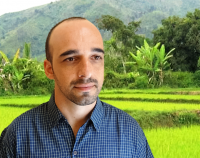 Less
Less- Posts: 3
- Likes received: 0
Re: MANUEL TECHNIQUE DE CONSTRUCTION DES TOILETTES AMELIOREES SSD-CI
Bonjour. Pouvez-vous vérifier que le lien vers le manuel existe ?
Note: Translation added by Moderator (CSM) using www.DeepL.com/Translator
Hello. Can you check if the link to the manual exists?
Note: Translation added by Moderator (CSM) using www.DeepL.com/Translator
Hello. Can you check if the link to the manual exists?
Please Log in to join the conversation.
You need to login to reply- USAIDssd
-

- SSD is a sanitation program funded by USAID, which aims to create sustainable sanitation market for the urban poor in Benin and Côte d'Ivoire. This market will elicit a demand for sanitation services and a reliable supply of high-quality sanitation products and services.
Less- Posts: 50
- Karma: 1
- Likes received: 9
Re: MANUEL TECHNIQUE DE CONSTRUCTION DES TOILETTES AMELIOREES SSD-CI
Ce manuel présente des guides de constructions illustrés, des recommandations concernant les dimensions , des recommandations sur les matériaux et leur dosage, les recommandations sur la maintenance des fosses septiques….
Ce manuel est le fruit de la collaboration entre le projet SSD financé par USAID et les services du ministères de l’assainissement. Ceci a été un modèle de collaboration entre une structure gouvernementale et le projet SSD pour concevoir un outil d’accompagnement des professionnels en charge de répondre qualitativement à la demande des populations en toilettes améliorées.
Il a été produit en 250 exemplaires et diffusé aux artisans , aux ministères , aux collectivités , à des ONG du secteur de l’assainissement , des bailleurs en vue de sa vulgarisation. Ce manuel est utilisé pour la formation des micro-entrepreneurs de l’assainissement. Le projet SSD et le ministère de l’assainissement ont mis en place des formations des artisans constructeurs de toilettes basées sur ces manuels.
Ainsi, Ce manuel sert également de référentiel pour le contrôle de la qualité des ouvrages d’assainissement construits par les artisans sur les derniers contrôles le taux de qualité est de 90% conforme aux instructions du manuel.
Le document est en pièce jointe pour téléchargement.
Note: Translation added by Moderator (CSM) using www.DeepL.com/Translator
This manual provides illustrated construction guides, recommendations on dimensions, recommendations on materials and their dosage, recommendations on maintenance of septic tanks....
This manual is the result of collaboration between the USAID-funded SSD project and the Ministry of Sanitation. This was a model of collaboration between a government structure and the SSD project to design a tool to support professionals in charge of responding qualitatively to the population's demand for improved toilets.
It was produced in 250 copies and distributed to craftsmen, ministries, communities, NGOs in the sanitation sector and donors for dissemination. This manual is used for the training of sanitation micro-entrepreneurs. The SSD project and the Ministry of Sanitation have set up training courses for toilet builders based on these manuals.
This manual is also used as a reference for the quality control of the sanitation works built by the artisans on the last controls the quality rate is 90% in accordance with the instructions of the manual.The document is attached for download.
Ce manuel est le fruit de la collaboration entre le projet SSD financé par USAID et les services du ministères de l’assainissement. Ceci a été un modèle de collaboration entre une structure gouvernementale et le projet SSD pour concevoir un outil d’accompagnement des professionnels en charge de répondre qualitativement à la demande des populations en toilettes améliorées.
Il a été produit en 250 exemplaires et diffusé aux artisans , aux ministères , aux collectivités , à des ONG du secteur de l’assainissement , des bailleurs en vue de sa vulgarisation. Ce manuel est utilisé pour la formation des micro-entrepreneurs de l’assainissement. Le projet SSD et le ministère de l’assainissement ont mis en place des formations des artisans constructeurs de toilettes basées sur ces manuels.
Ainsi, Ce manuel sert également de référentiel pour le contrôle de la qualité des ouvrages d’assainissement construits par les artisans sur les derniers contrôles le taux de qualité est de 90% conforme aux instructions du manuel.
Le document est en pièce jointe pour téléchargement.
Note: Translation added by Moderator (CSM) using www.DeepL.com/Translator
This manual provides illustrated construction guides, recommendations on dimensions, recommendations on materials and their dosage, recommendations on maintenance of septic tanks....
This manual is the result of collaboration between the USAID-funded SSD project and the Ministry of Sanitation. This was a model of collaboration between a government structure and the SSD project to design a tool to support professionals in charge of responding qualitatively to the population's demand for improved toilets.
It was produced in 250 copies and distributed to craftsmen, ministries, communities, NGOs in the sanitation sector and donors for dissemination. This manual is used for the training of sanitation micro-entrepreneurs. The SSD project and the Ministry of Sanitation have set up training courses for toilet builders based on these manuals.
This manual is also used as a reference for the quality control of the sanitation works built by the artisans on the last controls the quality rate is 90% in accordance with the instructions of the manual.The document is attached for download.
Learning and Communication Manager SSD|PSI Côte d’Ivoire
Please Log in to join the conversation.
You need to login to reply- USAIDssd
-

- SSD is a sanitation program funded by USAID, which aims to create sustainable sanitation market for the urban poor in Benin and Côte d'Ivoire. This market will elicit a demand for sanitation services and a reliable supply of high-quality sanitation products and services.
Less- Posts: 50
- Karma: 1
- Likes received: 9
Re: LE LEADERSHIP FEMININ AU SERVICE DU MARKETING DE L'ASSAINISSEMENT SSD-BENIN
L'émission vise à partager avec le public et les acteurs du secteur Eau et Assainissement, les résultats et principaux acquis du projet(i), montrer les retombées bénéfiques sur les femmes prestataires (micro-entrepreneurs) ((ii) et échanger sur l’amélioration des conditions d’assainissement des ménages (iii).
L'émission a d'abord fait ressortir le bilan du projet après 06ans de mise en œuvre en termes de promotion des produits WC MIMIN. Ainsi, plus de 30.000 produits ont été commercialisés par les prestataires micro-entrepreneurs avec près de 200.000 personnes impactées. Un résultat obtenu avec les contributions des femmes micro-entrepreneurs. En l'espace de 07 mois, une femme micro-entrepreneure a, elle seule, réalisé 720 produits.
Selon la représentante des communes partenaires, le projet a été véritablement une solution pour leurs administrés dans l'amélioration de leurs conditions d'assainissement.
Lien de Publication Youtub:
Note: Translation added by Moderator (CSM) using www.DeepL.com/Translator
The aim of the programme was to share with the public and stakeholders in the water and sanitation sector the results and main achievements of the project (i), to show the beneficial effects on women service providers (micro-entrepreneurs) (ii) and to discuss the improvement of household sanitation conditions (iii).
The programme began by highlighting the project's achievements after six years of implementation in terms of the promotion of WC MIMIN products. Thus, more than 30,000 products have been marketed by the micro-entrepreneur service providers with nearly 200,000 people impacted. A result obtained with the contributions of women micro-entrepreneurs. In the space of seven months, one woman micro-entrepreneur alone has produced 720 products.
According to the representative of the partner municipalities, the project has been a real solution for their constituents in improving their sanitation conditions. Youtub Publication Link:
L'émission a d'abord fait ressortir le bilan du projet après 06ans de mise en œuvre en termes de promotion des produits WC MIMIN. Ainsi, plus de 30.000 produits ont été commercialisés par les prestataires micro-entrepreneurs avec près de 200.000 personnes impactées. Un résultat obtenu avec les contributions des femmes micro-entrepreneurs. En l'espace de 07 mois, une femme micro-entrepreneure a, elle seule, réalisé 720 produits.
Selon la représentante des communes partenaires, le projet a été véritablement une solution pour leurs administrés dans l'amélioration de leurs conditions d'assainissement.
Lien de Publication Youtub:
Note: Translation added by Moderator (CSM) using www.DeepL.com/Translator
The aim of the programme was to share with the public and stakeholders in the water and sanitation sector the results and main achievements of the project (i), to show the beneficial effects on women service providers (micro-entrepreneurs) (ii) and to discuss the improvement of household sanitation conditions (iii).
The programme began by highlighting the project's achievements after six years of implementation in terms of the promotion of WC MIMIN products. Thus, more than 30,000 products have been marketed by the micro-entrepreneur service providers with nearly 200,000 people impacted. A result obtained with the contributions of women micro-entrepreneurs. In the space of seven months, one woman micro-entrepreneur alone has produced 720 products.
According to the representative of the partner municipalities, the project has been a real solution for their constituents in improving their sanitation conditions. Youtub Publication Link:
Learning and Communication Manager SSD|PSI Côte d’Ivoire
Please Log in to join the conversation.
You need to login to reply- USAIDssd
-

- SSD is a sanitation program funded by USAID, which aims to create sustainable sanitation market for the urban poor in Benin and Côte d'Ivoire. This market will elicit a demand for sanitation services and a reliable supply of high-quality sanitation products and services.
Less- Posts: 50
- Karma: 1
- Likes received: 9
Re: Progress so far ... Sanitation Service Delivery Program (PSI with PATH and WSUP, funded by USAID) - Ghana, Ivory Coast and Benin
In French:
'' Le projet SSD franchit une nouvelle étape dans la distribution des dispositifs de lavage des mains aux écoles ''
L’adoption des bonnes pratiques d’hygiène et d’assainissement représente l’un des objectifs primordiaux pour le projet Sanitation Service Delivery( SSD).
Répondre à ces besoins revient à mener des actions telles que le recrutement des comités locaux d’hygiène et d’assainissement, qui sera suivi de formation sur les différentes étapes du lavage des mains, de l’hygiène et de l’assainissement avec la collaboration des partenaires nationaux.
Les actions du projet vise à contribuer de manière significative à la riposte à la COVID-19 par des sensibilisations à l’endroit des communautés et apporter un appui aux efforts du Gouvernement ivoirien sur la santé globale de la population ivoirienne. Ainsi, dans cette dynamique de
renforcer les connaissances et pratiques des populations, le secteur éducatif se révèle être un défi aux actions de sensibilisation aux bonnes pratiques d’hygiène et d’assainissement.
De ce fait, ce mardi 18 mai 2021, à Tiassalé au sein du Groupe scolaire Dafindougou, le projet SSD à travers Population Services International de Côte d’Ivoire (PSI-CI), financé par l’USAID, a procédé au lancement officiel de ces activités de lancement de la distribution gratuite de 851 dispositifs de lavage des mains destinés aux écoles primaires et centres de santé des quinze(15) villes couvertes par notre projet d’assainissement dénommé Sanitation Service Delivery (SSD).
L’objectif est de non seulement mettre à disposition des DLM aux écoles, mais aussi de permettre aux enseignants et élèves se laver régulièrement les mains et de s’impliquer dans la gestion adéquate des DLM reçus. L’implication des Ministères du Gouvernement ivoirien témoigne du soutient qu’ils apportent aux actions de mise en œuvre du projet et à cette cérémonie de remise des 70 dispositifs de lavage des mains à la région de Tiassalé pour les écoles, les centres de santé et les lieux publics. Madame la Représentante Résidente de PSI-CI a indiqué dans son allocution que cette action a été possible grâce à l’appui du peuple américain à travers l’USAID. Elle a par ailleurs remercié les Ministères de la Santé, de l'Hygiène Publique et de la Couverture Maladie Universelle, Ministère de l'Education Nationale et de l'Alphabétisation et au Ministère de l'Assainissement à travers les Direction de l'Hygiène Publique et de la Santé-Environnement (DHPSE), la Direction de la Vie Scolaire (DVS) et celle de la Direction de l'Assainissement Rural (DAR) pour leur implication remarquable et la fructueuse collaboration dans l'exécution du projet SSD.
Cette implication permet à PSI Côte d’Ivoire de contribuer significativement à la politique nationale développée autour de la problématique de l’hygiène et de l’assainissement. Quant aux autorités locales, elles ont remercié l’USAID pour cette action qui complète parfaitement celles déjà déployés dans leur région. Les responsables des établissements scolaires bénéficiaires des dispositifs de lavage des mains ont promis de poursuivre la sensibilisation des élèves sur la nécessité du lavage des mains et du respect des mesures barrières.
'' Le projet SSD franchit une nouvelle étape dans la distribution des dispositifs de lavage des mains aux écoles ''
L’adoption des bonnes pratiques d’hygiène et d’assainissement représente l’un des objectifs primordiaux pour le projet Sanitation Service Delivery( SSD).
Répondre à ces besoins revient à mener des actions telles que le recrutement des comités locaux d’hygiène et d’assainissement, qui sera suivi de formation sur les différentes étapes du lavage des mains, de l’hygiène et de l’assainissement avec la collaboration des partenaires nationaux.
Les actions du projet vise à contribuer de manière significative à la riposte à la COVID-19 par des sensibilisations à l’endroit des communautés et apporter un appui aux efforts du Gouvernement ivoirien sur la santé globale de la population ivoirienne. Ainsi, dans cette dynamique de
renforcer les connaissances et pratiques des populations, le secteur éducatif se révèle être un défi aux actions de sensibilisation aux bonnes pratiques d’hygiène et d’assainissement.
De ce fait, ce mardi 18 mai 2021, à Tiassalé au sein du Groupe scolaire Dafindougou, le projet SSD à travers Population Services International de Côte d’Ivoire (PSI-CI), financé par l’USAID, a procédé au lancement officiel de ces activités de lancement de la distribution gratuite de 851 dispositifs de lavage des mains destinés aux écoles primaires et centres de santé des quinze(15) villes couvertes par notre projet d’assainissement dénommé Sanitation Service Delivery (SSD).
L’objectif est de non seulement mettre à disposition des DLM aux écoles, mais aussi de permettre aux enseignants et élèves se laver régulièrement les mains et de s’impliquer dans la gestion adéquate des DLM reçus. L’implication des Ministères du Gouvernement ivoirien témoigne du soutient qu’ils apportent aux actions de mise en œuvre du projet et à cette cérémonie de remise des 70 dispositifs de lavage des mains à la région de Tiassalé pour les écoles, les centres de santé et les lieux publics. Madame la Représentante Résidente de PSI-CI a indiqué dans son allocution que cette action a été possible grâce à l’appui du peuple américain à travers l’USAID. Elle a par ailleurs remercié les Ministères de la Santé, de l'Hygiène Publique et de la Couverture Maladie Universelle, Ministère de l'Education Nationale et de l'Alphabétisation et au Ministère de l'Assainissement à travers les Direction de l'Hygiène Publique et de la Santé-Environnement (DHPSE), la Direction de la Vie Scolaire (DVS) et celle de la Direction de l'Assainissement Rural (DAR) pour leur implication remarquable et la fructueuse collaboration dans l'exécution du projet SSD.
Cette implication permet à PSI Côte d’Ivoire de contribuer significativement à la politique nationale développée autour de la problématique de l’hygiène et de l’assainissement. Quant aux autorités locales, elles ont remercié l’USAID pour cette action qui complète parfaitement celles déjà déployés dans leur région. Les responsables des établissements scolaires bénéficiaires des dispositifs de lavage des mains ont promis de poursuivre la sensibilisation des élèves sur la nécessité du lavage des mains et du respect des mesures barrières.
++++++++++
In English:
SSD project takes next step in distributing handwashing devices to schools
The adoption of good hygiene and sanitation practices is one of the primary objectives of the Sanitation Service Delivery (SSD) project.
Responding to these needs means carrying out actions such as the recruitment of local hygiene and sanitation committees, which will be followed by training on the different stages of handwashing, hygiene and sanitation with the collaboration of national partners.
The project's actions aim to contribute significantly to the response to COVID-19 by raising awareness among communities and supporting the Ivorian government's efforts to improve the overall health of the Ivorian population. Thus, in this dynamic of
Thus, in this dynamic of reinforcing the knowledge and practices of the populations, the educational sector is a challenge to the actions of sensitization to good hygiene and sanitation practices.
Therefore, this Tuesday, May 18, 2021, in Tiassalé within the Dafindougou School Group, the SSD project through Population Services International of Côte d'Ivoire (PSI-CI), financed by USAID, proceeded to the official launch of these activities to launch the free distribution of 851 handwashing devices intended for primary schools and health centres of the fifteen (15) cities covered by our sanitation project called Sanitation Service Delivery (SSD).
The aim is not only to provide schools with MLDs, but also to enable teachers and pupils to wash their hands regularly and to get involved in the proper management of the MLDs received. The involvement of the Ivorian Government Ministries is a testament to their support for the implementation of the project and for this handover ceremony of 70 handwashing devices in the Tiassalé region for schools, health centres and public places. In her speech, the PSI-CI Resident Representative indicated that this action was possible thanks to the support of the American people through USAID. She also thanked the Ministries of Health, Public Hygiene and Universal Health Coverage, the Ministry of Education and Literacy and the Ministry of Sanitation through the Directorate of Public Hygiene and Health-Environment (DHPSE), the Directorate of School Life (DVS) and the Directorate of Rural Sanitation (DAR) for their remarkable involvement and fruitful collaboration in the implementation of the SSD project.
This involvement allows PSI Côte d'Ivoire to contribute significantly to the national policy developed around the issue of hygiene and sanitation. As for the local authorities, they thanked USAID for this action which perfectly complements those already deployed in their region. The heads of the schools benefiting from the handwashing devices promised to continue raising awareness among students about the need to wash their hands and respect the barrier measures.
(Translated with www.DeepL.com/Translator)
In English:
SSD project takes next step in distributing handwashing devices to schools
The adoption of good hygiene and sanitation practices is one of the primary objectives of the Sanitation Service Delivery (SSD) project.
Responding to these needs means carrying out actions such as the recruitment of local hygiene and sanitation committees, which will be followed by training on the different stages of handwashing, hygiene and sanitation with the collaboration of national partners.
The project's actions aim to contribute significantly to the response to COVID-19 by raising awareness among communities and supporting the Ivorian government's efforts to improve the overall health of the Ivorian population. Thus, in this dynamic of
Thus, in this dynamic of reinforcing the knowledge and practices of the populations, the educational sector is a challenge to the actions of sensitization to good hygiene and sanitation practices.
Therefore, this Tuesday, May 18, 2021, in Tiassalé within the Dafindougou School Group, the SSD project through Population Services International of Côte d'Ivoire (PSI-CI), financed by USAID, proceeded to the official launch of these activities to launch the free distribution of 851 handwashing devices intended for primary schools and health centres of the fifteen (15) cities covered by our sanitation project called Sanitation Service Delivery (SSD).
The aim is not only to provide schools with MLDs, but also to enable teachers and pupils to wash their hands regularly and to get involved in the proper management of the MLDs received. The involvement of the Ivorian Government Ministries is a testament to their support for the implementation of the project and for this handover ceremony of 70 handwashing devices in the Tiassalé region for schools, health centres and public places. In her speech, the PSI-CI Resident Representative indicated that this action was possible thanks to the support of the American people through USAID. She also thanked the Ministries of Health, Public Hygiene and Universal Health Coverage, the Ministry of Education and Literacy and the Ministry of Sanitation through the Directorate of Public Hygiene and Health-Environment (DHPSE), the Directorate of School Life (DVS) and the Directorate of Rural Sanitation (DAR) for their remarkable involvement and fruitful collaboration in the implementation of the SSD project.
This involvement allows PSI Côte d'Ivoire to contribute significantly to the national policy developed around the issue of hygiene and sanitation. As for the local authorities, they thanked USAID for this action which perfectly complements those already deployed in their region. The heads of the schools benefiting from the handwashing devices promised to continue raising awareness among students about the need to wash their hands and respect the barrier measures.
(Translated with www.DeepL.com/Translator)
Learning and Communication Manager SSD|PSI Côte d’Ivoire
Please Log in to join the conversation.
You need to login to reply- USAIDssd
-

- SSD is a sanitation program funded by USAID, which aims to create sustainable sanitation market for the urban poor in Benin and Côte d'Ivoire. This market will elicit a demand for sanitation services and a reliable supply of high-quality sanitation products and services.
Less- Posts: 50
- Karma: 1
- Likes received: 9
Re: De l’USAID RFA - USAID/West Africa’s Sanitation Service Delivery (SSD) Program
« La promotion de l’hygiène, du lavage des mains et de l’assainissement amélioré dans sa contribution à la riposte aux maladies telles que le COVID19. »
Le projet SSD a tenu une série de rencontres communautaires à Yopougon et Abobo dans le mois de Mars.
Au cours de ces rencontres, l’équipe projet SSD a discuté avec les responsables des comités d’assainissement des conditions de relancer leurs activités leaders.
Neuf (9) comités ont été rencontrés dont cinq (05) à Yopougon et quatre (04) à Abobo. Quatre (04) comités ont à l’époque participé aux activités du projet dans leurs communautés respectives sur les 7 ayant bénéficié d’une formation à la participation communautaire et la conduite d’une activité de sensibilisation »[/i]en 2018 par le projet SSD. Ces comités n’ont pas certains ont été restructurés, sont tous d’accord pour continuer ou relancer leurs actions de proximité en rencontré l’accent sur le lavage des mains et l’utilisation des toilettes et ouvrages d’assainissement adéquats. La mise en place de comités locaux répond au besoin de relayer les messages de sensibilisation dans leurs communautés respectives. Ces actions de communication visent à faire la promotion de l’hygiène, du lavage des mains et de l’assainissement amélioré et contribuer ainsi à la riposte aux maladies telles que le COVID19.
Le projet SSD, en cette 7 année consacrée en partie à la riposte à la pandémie du COVID19, compte installateur 75 comités dans les 15 localités de mise en œuvre. Pour ce faire, les 5 plus grandes agglomérations ayant des problèmes d’assainissement ont été choisis pour abriter lesdits comités. A ce jour, après le tour dans toutes les localités cibles, 58 comités ont été constitués sur 75, soit 77,33% de taux de réalisation. Ils seront formés et installés pour conduire des actions de sensibilisation au profit de leurs communautés respectives.
++ ENGLISH ++
“ Promoting improved hygiene, handwashing and sanitation in contributing to the response to diseases such as COVID19 ”
The SSD project held a series of community meetings in Yopougon and Abobo in the month of March.
During these meetings, the SSD project team discussed with the heads of the sanitation committees the conditions for relaunching their leading activities. Nine (9) committees were met, including five (05) in Yopougon and four (04) in Abobo. At the time, four (04) committees participated in project activities in their respective communities out of the 7 that received training in `` community participation and the conduct of an awareness activity '' in 2018 by the project SSD. These committees, some of which have been restructured, all agree to continue or relaunch their outreach actions by emphasizing hand washing and the use of adequate toilets and sanitation facilities. The establishment of local committees responds to the need to relay awareness messages in their respective communities. These communication actions aim to promote hygiene, hand washing and improved sanitation and thus contribute to the response to diseases such as COVID19.
The SSD project, in this 7th year devoted in part to the response to the COVID19 pandemic, intends to set up 75 committees in the 15 localities of implementation. To do this, the 5 largest agglomerations with sanitation problems were chosen to house the said committees. To date, after the round in all the target localities, 58 committees have been set up out of 75, that is to say 77.33% of completion rate. They will be trained and installed to conduct awareness actions for the benefit of their respective communities.
Learning and Communication Manager SSD|PSI Côte d’Ivoire
Attachments:
-
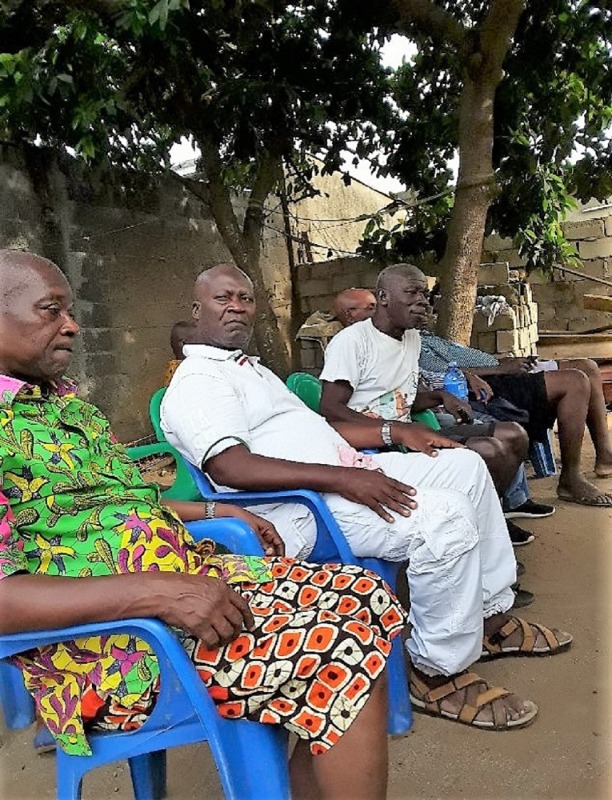 Image42.jpg
(Filesize: 233KB)
Image42.jpg
(Filesize: 233KB)
-
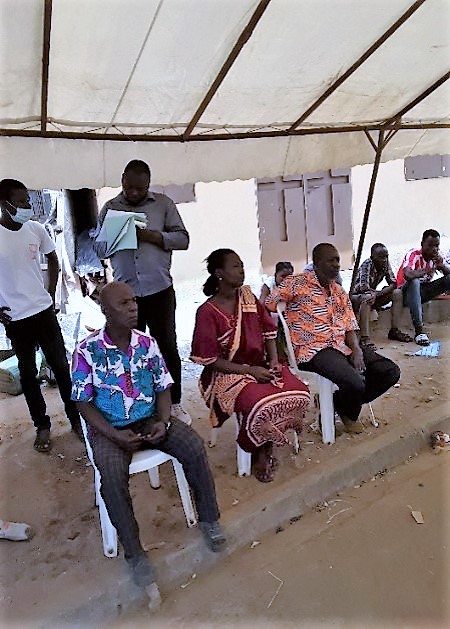 Image22.jpg
(Filesize: 121KB)
Image22.jpg
(Filesize: 121KB)
Please Log in to join the conversation.
You need to login to reply- USAIDssd
-

- SSD is a sanitation program funded by USAID, which aims to create sustainable sanitation market for the urban poor in Benin and Côte d'Ivoire. This market will elicit a demand for sanitation services and a reliable supply of high-quality sanitation products and services.
Less- Posts: 50
- Karma: 1
- Likes received: 9
Re: Progress so far ... Sanitation Service Delivery Program (PSI with PATH and WSUP, funded by USAID) - Ghana, Ivory Coast and Benin
Enfin des lendemains meilleurs grâce à ce métier !
Après des années de travail infructueux dans la maçonnerie, l’interrogeait de M. Dosso sur l’amélioration de sa qualité de vie et celle de sa famille.
Résidant de la ville d’Oumé, Dosso est à la recherche d’opportunités lucratives, quand il fût approché par un agent de la mairie de sa localité. Celle-ci lui présenta les possibilités liées à l’installation de toilettes et ouvrages « SaniPlus » développées au travers du projet Sanitation Service Delivery (SSD) mis en œuvre par l’ONG américaine PSI-CI. Convaincu que la qualité de vie de ses compatriotes pourrait s’améliorer par l’utilisation des toilettes améliorées en milieu rural qu’urbain, Dosso va entreprendre les démarches pour devenir entrepreneur dans la ville d’Oumé. Il a renforcé ses compétences en fabrication de toilettes SaniPlus. Puis, crée son entreprise dénommée « ETS Dosso » sis au quartier « Yaofla ».
Malgré ses débuts difficiles, Dosso, sillonnait les ménages de la ville et des villages pour promouvoir sa société et ses produits ne font pas d’offre par « SaniPlus ».
Quelques mois plus tard, la qualité des ouvrages « SaniPlus » et le retour des ménages satisfaits ont porté l’écho de son savoir-faire dans la ville et les villages d’Oumé. Par soucis de peaufiner sa stratégie pour un meilleur positionnement sur le marché.
Dosso s’associe à une entreprise de fabrique de briques et de balouses pour mieux vendre ces ouvrages.
Cette approche va être payant et lui donner les possibilités d’acheter en gros du gravier et de posséder un tricycle pour faciliter ses livraisons croissantes. Très vite, ses installations de WC " SaniPlus » en zones rurales vont connaître un bond et lui offrir les ressources nécessaires pour envisager l’ouverture prochaine d’un deuxième point de vente.
Aujourd’hui, Dosso rêve de conquérir les villes voisines par des points de vente « SaniPlus ».
+++++++
English:
Finally a better tomorrow thanks to this trade!
After years of unsuccessful work in masonry, Mr. Dosso's question was about improving his quality of life and that of his family.
A resident of the town of Oumé, Dosso was looking for lucrative opportunities when he was approached by an official from the local town hall. The latter presented him with the possibilities linked to the installation of "SaniPlus" toilets and structures developed through the Sanitation Service Delivery (SSD) project implemented by the American NGO PSI-CI. Convinced that the quality of life of his compatriots could be improved by the use of improved toilets in both rural and urban areas, Dosso will take steps to become an entrepreneur in the town of Oumé. He strengthened his skills in manufacturing SaniPlus toilets. Then, he created his company called "ETS Dosso" located in the "Yaofla" district.
Despite his difficult beginnings, Dosso went around the households of the town and villages to promote his company and his products were not offered by "SaniPlus".
A few months later, the quality of the "SaniPlus" works and the return of satisfied households brought the echo of his know-how in the town and villages of Oumé. In an effort to fine-tune its strategy for better market positioning.
Dosso joined forces with a brick and sweepings company to better sell these works.
This approach paid off and gave him the opportunity to buy gravel in bulk and own a tricycle to facilitate his growing deliveries. Soon, his "SaniPlus" toilet installations in rural areas would take off and provide him with the resources to consider opening a second outlet soon.
Today, Dosso dreams of conquering neighbouring towns with "SaniPlus" outlets.
Translated with www.DeepL.com/Translator (free version)
Après des années de travail infructueux dans la maçonnerie, l’interrogeait de M. Dosso sur l’amélioration de sa qualité de vie et celle de sa famille.
Résidant de la ville d’Oumé, Dosso est à la recherche d’opportunités lucratives, quand il fût approché par un agent de la mairie de sa localité. Celle-ci lui présenta les possibilités liées à l’installation de toilettes et ouvrages « SaniPlus » développées au travers du projet Sanitation Service Delivery (SSD) mis en œuvre par l’ONG américaine PSI-CI. Convaincu que la qualité de vie de ses compatriotes pourrait s’améliorer par l’utilisation des toilettes améliorées en milieu rural qu’urbain, Dosso va entreprendre les démarches pour devenir entrepreneur dans la ville d’Oumé. Il a renforcé ses compétences en fabrication de toilettes SaniPlus. Puis, crée son entreprise dénommée « ETS Dosso » sis au quartier « Yaofla ».
Malgré ses débuts difficiles, Dosso, sillonnait les ménages de la ville et des villages pour promouvoir sa société et ses produits ne font pas d’offre par « SaniPlus ».
Quelques mois plus tard, la qualité des ouvrages « SaniPlus » et le retour des ménages satisfaits ont porté l’écho de son savoir-faire dans la ville et les villages d’Oumé. Par soucis de peaufiner sa stratégie pour un meilleur positionnement sur le marché.
Dosso s’associe à une entreprise de fabrique de briques et de balouses pour mieux vendre ces ouvrages.
Cette approche va être payant et lui donner les possibilités d’acheter en gros du gravier et de posséder un tricycle pour faciliter ses livraisons croissantes. Très vite, ses installations de WC " SaniPlus » en zones rurales vont connaître un bond et lui offrir les ressources nécessaires pour envisager l’ouverture prochaine d’un deuxième point de vente.
Aujourd’hui, Dosso rêve de conquérir les villes voisines par des points de vente « SaniPlus ».
+++++++
English:
Finally a better tomorrow thanks to this trade!
After years of unsuccessful work in masonry, Mr. Dosso's question was about improving his quality of life and that of his family.
A resident of the town of Oumé, Dosso was looking for lucrative opportunities when he was approached by an official from the local town hall. The latter presented him with the possibilities linked to the installation of "SaniPlus" toilets and structures developed through the Sanitation Service Delivery (SSD) project implemented by the American NGO PSI-CI. Convinced that the quality of life of his compatriots could be improved by the use of improved toilets in both rural and urban areas, Dosso will take steps to become an entrepreneur in the town of Oumé. He strengthened his skills in manufacturing SaniPlus toilets. Then, he created his company called "ETS Dosso" located in the "Yaofla" district.
Despite his difficult beginnings, Dosso went around the households of the town and villages to promote his company and his products were not offered by "SaniPlus".
A few months later, the quality of the "SaniPlus" works and the return of satisfied households brought the echo of his know-how in the town and villages of Oumé. In an effort to fine-tune its strategy for better market positioning.
Dosso joined forces with a brick and sweepings company to better sell these works.
This approach paid off and gave him the opportunity to buy gravel in bulk and own a tricycle to facilitate his growing deliveries. Soon, his "SaniPlus" toilet installations in rural areas would take off and provide him with the resources to consider opening a second outlet soon.
Today, Dosso dreams of conquering neighbouring towns with "SaniPlus" outlets.
Translated with www.DeepL.com/Translator (free version)
Learning and Communication Manager SSD|PSI Côte d’Ivoire
Attachments:
-
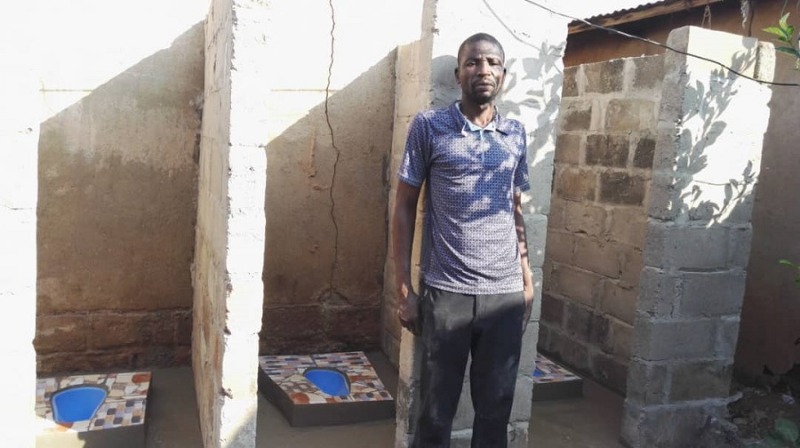 IMG-202102...0035.jpg
(Filesize: 83KB)
IMG-202102...0035.jpg
(Filesize: 83KB)
-
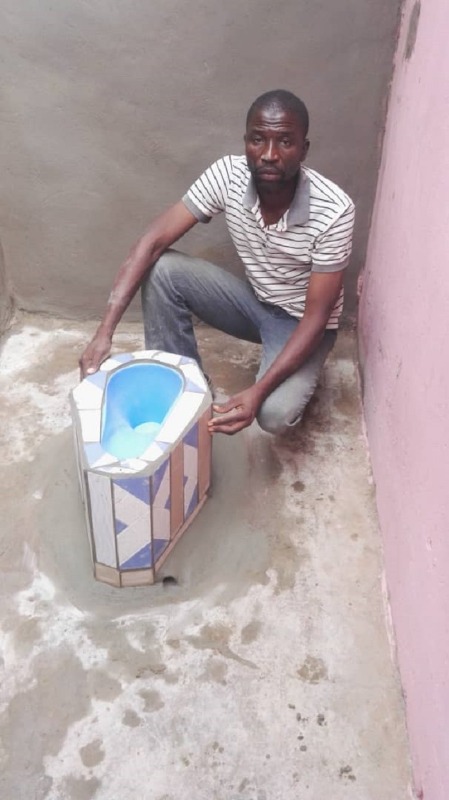 IMG-202102...0045.jpg
(Filesize: 71KB)
IMG-202102...0045.jpg
(Filesize: 71KB)
-
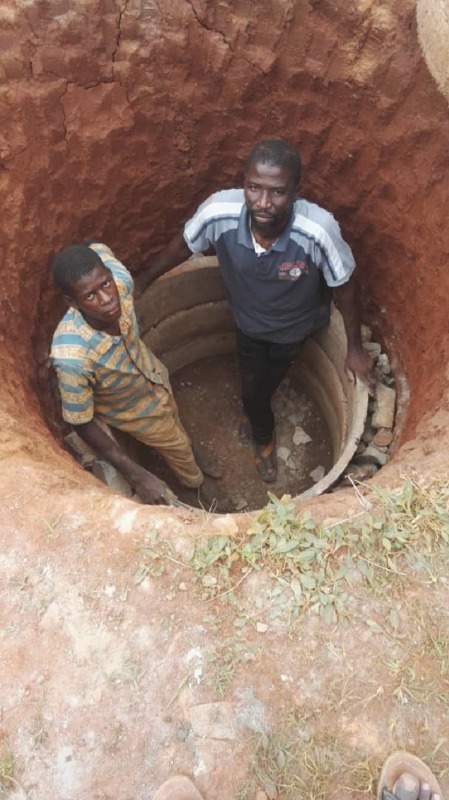 IMG-202102...0049.jpg
(Filesize: 106KB)
IMG-202102...0049.jpg
(Filesize: 106KB)
-
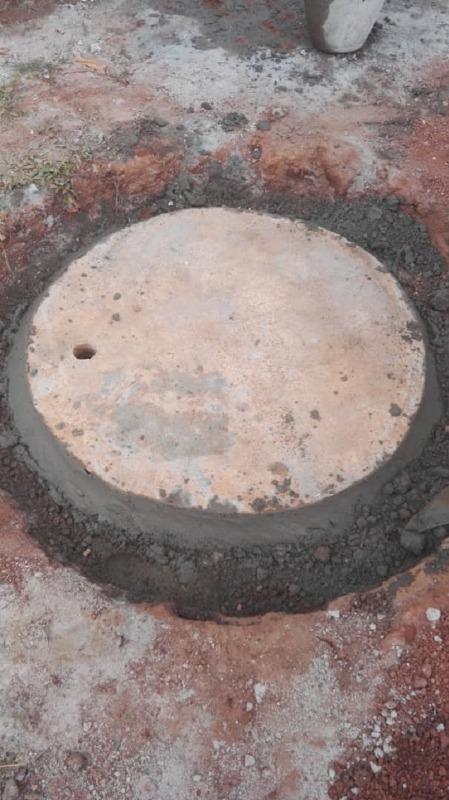 IMG-202102...0051.jpg
(Filesize: 109KB)
IMG-202102...0051.jpg
(Filesize: 109KB)
-
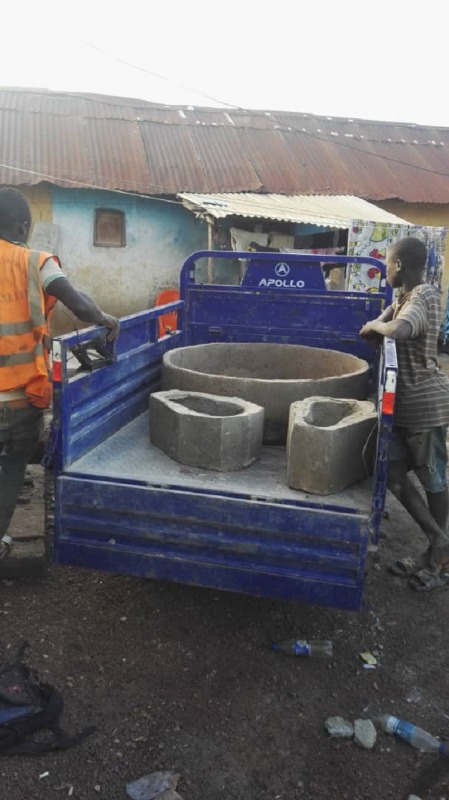 IMG-202102...0034.jpg
(Filesize: 83KB)
IMG-202102...0034.jpg
(Filesize: 83KB)
Please Log in to join the conversation.
You need to login to reply- USAIDssd
-

- SSD is a sanitation program funded by USAID, which aims to create sustainable sanitation market for the urban poor in Benin and Côte d'Ivoire. This market will elicit a demand for sanitation services and a reliable supply of high-quality sanitation products and services.
Less- Posts: 50
- Karma: 1
- Likes received: 9
Re: From USAID RFA - USAID/West Africa's Sanitation Service Delivery (SSD) Program / SSD -BENIN
Le projet SSD forme des femmes leaders de la commune d’Allada sur les généralités et les comportements favorables en prévention de la COVID- 19
Plus de 50 femmes leaders communautaires de profil élues locales et dirigeantes d’associations féminines ont vu leurs capacités renforcer sur les bonnes pratiques afin de rompre la chaine de contamination de la COVID 19 au niveau communautaire. C’était à l’occasion d’un atelier organisé par le projet de prestation des services d’assainissement SSD le jeudi 18 mars 2021 à la salle de conférence du centre de promotion sociale d’Allada. Financé par l’USAID, le projet, en dehors de ses objectifs initiaux accompagne, depuis le mois d’octobre 2020, la mise œuvre du plan de riposte à la COVID -19 initiées par le gouvernement à travers le pilier communication des risques et engagement communautaire Placée sous les auspices du ministère de la santé à travers la coordination de la composante hygiène et assainissement du département de l’Atlantique, la rencontre a connu la participation d’autres acteurs à savoir : le technicien d’hygiène officiant au niveau de la zone sanitaire, le responsable eau hygiène et assainissement basé à la marie et la direction départementale de la famille du département concerné. Le but visé était d’amener des femmes leaders à être de véritables relais de sensibilisation au sein de leur communauté respective dans un contexte
marqué par la hausse des cas graves et décès attribués à la maladie à coronavirus, COVID19.
Sur la base d’une présentation Powerpoint et des échanges interactifs, les participantes ont pu être bien éclairées sur l’analyse de la situation actuelle caractérisée entre autres par l’augmentation des cas graves de COVID -19, les différents modes de transmission, les bonnes pratiques de l’hygiène des mains et du port correct des masques ainsi que sur l’éventail des mesures mises en place par le gouvernement pour freiner cette pandémie. Ladite communication a été appuyée par l’intervention de la représentante de la direction départementale de la famille, qui volontiers a partagé sa vie de l’annonce de la COVID -19 à la guérison. Cette expérience a visiblement permis aux participantes de se rendre compte de l’existence de la COVID 19 et la nécessité d’une prise en charge précoce.
Pour leur part, les femmes leaders ont montré beaucoup d’enthousiasme et une grande motivation à diffuser à toutes les occasions, les informations captées au sein de leur communauté respective. De plus, cet état d’esprit affiché par ces femmes s’est vu renforcer par les mots de la fin du coordonnateur de la composante hygiène et assainissement de base « je vous invite à ne pas garder les messages échangés pour vous mais plutôt à les relayer dans votre entourage ».
English
The SSD project trains women leaders in municipality of Allada on generalities and favorable behaviors in the prevention of COVID-19
More than 50 women community leaders of localelected profile and leaders of women's associations have seen their capacities
strengthened on good practices in order to break the chain of contamination of COVID 19 at the community level. It was during a workshop organized by the SSD (Sanitation Service Delivery) Project on Thursday, March 18, 2021 at the conference room of the Allada Social Promotion Center. Funded by USAID, the project, apart from its initial objectives, has been supporting, since October 2020, the implementation of the COVID -19 response plan initiated by the government through disease risk communication and community engagement.
Under the leadership of the Ministry of Healththrough the coordination of the hygiene and sanitation component of the Atlantic department, and other sanitary keystakeholders as: hygiene advisor (health zone), the WASH manager in the municipality and the Ministry of Family departmental management. The goal was to bring women leaders to be true outreach relays within their respective communities in a context marked by the increase in serious cases and deaths attributed to the coronavirus disease.
Through presentations and interactive discussions, the participants werewell informed on the analysis of the current situation characterized, by the increase of severe cases of COVID -19, the different modes of transmission, the good practices of hand hygiene and the correct wearing of masks as well as the others measures implemented by the government to curb this pandemic. The
communications were supported by the intervention of the representative of the departmental management of the Ministry of the Family, who shared her experience as a person who contracted COVID -19: from the announcement of the test result until his healing. This experience enabled participants to realize the existence of COVID 19 and the need for early treatment.
For their part, the women leaders showed great enthusiasm and greatmotivation to disseminate at all times the information acquired within their respective communities. In addition, this state of mind displayed by these women was reinforced by the concluding words of the coordinator of the basic hygiene and sanitation component, namely: "I invite you not to keep the messages
for yourself but rather to relay them to your community ".
Note that as of March 22, 2021, Benin has a total of 7,100 cases ofCOVID-19, 6,452 cured and 90 deaths. In addition, this training session for women community leaders is aligned on the theme chosen for the celebration of International Women's Day this year "Female leadership: For an egalitarian future in the world of COVID-19".
Plus de 50 femmes leaders communautaires de profil élues locales et dirigeantes d’associations féminines ont vu leurs capacités renforcer sur les bonnes pratiques afin de rompre la chaine de contamination de la COVID 19 au niveau communautaire. C’était à l’occasion d’un atelier organisé par le projet de prestation des services d’assainissement SSD le jeudi 18 mars 2021 à la salle de conférence du centre de promotion sociale d’Allada. Financé par l’USAID, le projet, en dehors de ses objectifs initiaux accompagne, depuis le mois d’octobre 2020, la mise œuvre du plan de riposte à la COVID -19 initiées par le gouvernement à travers le pilier communication des risques et engagement communautaire Placée sous les auspices du ministère de la santé à travers la coordination de la composante hygiène et assainissement du département de l’Atlantique, la rencontre a connu la participation d’autres acteurs à savoir : le technicien d’hygiène officiant au niveau de la zone sanitaire, le responsable eau hygiène et assainissement basé à la marie et la direction départementale de la famille du département concerné. Le but visé était d’amener des femmes leaders à être de véritables relais de sensibilisation au sein de leur communauté respective dans un contexte
marqué par la hausse des cas graves et décès attribués à la maladie à coronavirus, COVID19.
Sur la base d’une présentation Powerpoint et des échanges interactifs, les participantes ont pu être bien éclairées sur l’analyse de la situation actuelle caractérisée entre autres par l’augmentation des cas graves de COVID -19, les différents modes de transmission, les bonnes pratiques de l’hygiène des mains et du port correct des masques ainsi que sur l’éventail des mesures mises en place par le gouvernement pour freiner cette pandémie. Ladite communication a été appuyée par l’intervention de la représentante de la direction départementale de la famille, qui volontiers a partagé sa vie de l’annonce de la COVID -19 à la guérison. Cette expérience a visiblement permis aux participantes de se rendre compte de l’existence de la COVID 19 et la nécessité d’une prise en charge précoce.
Pour leur part, les femmes leaders ont montré beaucoup d’enthousiasme et une grande motivation à diffuser à toutes les occasions, les informations captées au sein de leur communauté respective. De plus, cet état d’esprit affiché par ces femmes s’est vu renforcer par les mots de la fin du coordonnateur de la composante hygiène et assainissement de base « je vous invite à ne pas garder les messages échangés pour vous mais plutôt à les relayer dans votre entourage ».
English
The SSD project trains women leaders in municipality of Allada on generalities and favorable behaviors in the prevention of COVID-19
More than 50 women community leaders of localelected profile and leaders of women's associations have seen their capacities
strengthened on good practices in order to break the chain of contamination of COVID 19 at the community level. It was during a workshop organized by the SSD (Sanitation Service Delivery) Project on Thursday, March 18, 2021 at the conference room of the Allada Social Promotion Center. Funded by USAID, the project, apart from its initial objectives, has been supporting, since October 2020, the implementation of the COVID -19 response plan initiated by the government through disease risk communication and community engagement.
Under the leadership of the Ministry of Healththrough the coordination of the hygiene and sanitation component of the Atlantic department, and other sanitary keystakeholders as: hygiene advisor (health zone), the WASH manager in the municipality and the Ministry of Family departmental management. The goal was to bring women leaders to be true outreach relays within their respective communities in a context marked by the increase in serious cases and deaths attributed to the coronavirus disease.
Through presentations and interactive discussions, the participants werewell informed on the analysis of the current situation characterized, by the increase of severe cases of COVID -19, the different modes of transmission, the good practices of hand hygiene and the correct wearing of masks as well as the others measures implemented by the government to curb this pandemic. The
communications were supported by the intervention of the representative of the departmental management of the Ministry of the Family, who shared her experience as a person who contracted COVID -19: from the announcement of the test result until his healing. This experience enabled participants to realize the existence of COVID 19 and the need for early treatment.
For their part, the women leaders showed great enthusiasm and greatmotivation to disseminate at all times the information acquired within their respective communities. In addition, this state of mind displayed by these women was reinforced by the concluding words of the coordinator of the basic hygiene and sanitation component, namely: "I invite you not to keep the messages
for yourself but rather to relay them to your community ".
Note that as of March 22, 2021, Benin has a total of 7,100 cases ofCOVID-19, 6,452 cured and 90 deaths. In addition, this training session for women community leaders is aligned on the theme chosen for the celebration of International Women's Day this year "Female leadership: For an egalitarian future in the world of COVID-19".
Learning and Communication Manager SSD|PSI Côte d’Ivoire
Attachments:
-
DSC_8063.JPG (Filesize: 188KB)
-
DSC_8044.JPG (Filesize: 200KB)
Please Log in to join the conversation.
You need to login to reply- USAIDssd
-

- SSD is a sanitation program funded by USAID, which aims to create sustainable sanitation market for the urban poor in Benin and Côte d'Ivoire. This market will elicit a demand for sanitation services and a reliable supply of high-quality sanitation products and services.
Less- Posts: 50
- Karma: 1
- Likes received: 9
« De l’informatique aux ouvrages SaniPlus »
Que de chemin parcouru pour le fondateur de la Très Petite Entreprise (TPE)« ETSSCHADAÏ » KOUAME Djeah Eudes.
En effet, il ne s’était pas imaginé devenir entrepreneur et surtout travailler en partenariat avec l’ONG américaine PSI/CI au travers du
projet SSD.
Ce jeune informaticien de formation, originaire de la ville de Yamoussoukro était sans emploi durant une bonne période. Désemparé et en quête de revenus constant pour subvenir à ses besoins, Djeah va solliciter l’aide d’un proche afin d’obtenir du travail. Celui-ci va conseiller Djeah et l’initier à l’apprentissage d’installation d’ouvrages « SaniPlus ».
Après un an de travail acharné, il obtient la proposition de s’installer à Gagnoa pour la conception de toilettes. Cette décision lui
permettra de gagner une prime de trois mille (3000) francs sur chaque toilette installée.
Par la suite, ASSILIBA Kouamé, technicien supérieur va renforcer ses compétences dans ce domaine pour lui donner les moyens techniques d’être à son propre compte.
Fort de cette formation, Djeah va répondre aux exigences administratives et ouvrir son entreprise. Les débuts ont été difficile et les
résultats pas fameux. A la base, le manque de matériels (moules d’un de ses confrères) pour confectionner des préfabriqués et l’enclavement des sites devront trouver rapidement une solution. Qui plus est, la méconnaissance des ouvrages «SaniPlus » en zone péri-urbaine et rurale va contribuer à la réticence des populations vis-à-vis de ce produit. Pour relever ces défis et se positionner sur le marché, Djeah va cibler certains villages et se faire aider par des bénévoles locaux en vue d’accentuer la sensibilisation des ménages sur les bienfaits de ces produits. Cette stratégie s’avère payante dans la mesure ou lesmois suivants, plusieurs ouvrages ont été installés pour un revenu mensuel équivalant à deux cents cinquante (250) milles francs CFA. Aujourd’hui, Djeah dirige
une équipe de douze (12) personnes et prévoit installer un point de vente de ces ouvrages à Galébré, un village situé à 39 Km de Gagnoa car selon lui : « Les villageois apprécient le bienfait des toilettes SaniPlus, car elles améliorent leur qualité de vie. »
Ainsi, afin de mieux vendre et être proche de la population en zones rurales, Djeah décida de faire de Galébré son point de vente
des toilettes Saniplus ».
Note: Translation added by Moderator (CSM) using www.DeepL.com/Translator
"From computers to SaniPlus works''The founder of the Very Small Enterprise (VSE) "ETSSCHADAÏ" KOUAME Djeah Eudes has come a long way.Indeed, he had never imagined becoming an entrepreneur and especially working in partnership with the American NGO PSI/CI through the SSD project.
This young computer scientist from the town of Yamoussoukro was unemployed for a long time. Distraught and in search of a steady income to support himself, Djeah sought the help of a relative in order to get a job. This person will advise Djeah and introduce him to the "SaniPlus" installation apprenticeship.After a year of hard work, he was offered the opportunity to set up a toilet design business in Gagnoa. This decision This decision allowed him to earn a bonus of three thousand (3000) francs for each toilet installed.
Subsequently, ASSILIBA Kouamé, a senior technician, reinforced his skills in this field to give him the technical means to be self-employed.With this training, Djeah will meet the administrative requirements and open his business. The beginning was difficult and the result sand the results not so good. The lack of materials (moulds from one of his colleagues) to make prefabricated buildings and the isolation of the sites had to be resolved quickly. Moreover, the lack of knowledge of "SaniPlus" works in peri-urban and rural areas will contribute to the reluctance of the population towards this product.
To meet these challenges and position itself in the market, Djeah will target certain villages and enlist the help of local volunteers to increase household awareness of the benefits of these products. This strategy paid off as in the following months, several structures were installed for a monthly income equivalent to two hundred and fifty (250) thousand CFA francs.
Today, Djeah managesToday, Djeah manages a team of twelve (12) people and plans to set up a point of sale of these structures in Galébré, a village located 39 km from Gagnoa because, according to him, "The villagers appreciate the benefits of SaniPlus toilets, because they improve their quality of life. So, in order to sell better and to be close to the population in rural areas, Djeah decided to make Galébré his point of saleSaniplus toilets".
Learning and Communication Manager SSD|PSI Côte d’Ivoire
Attachments:
-
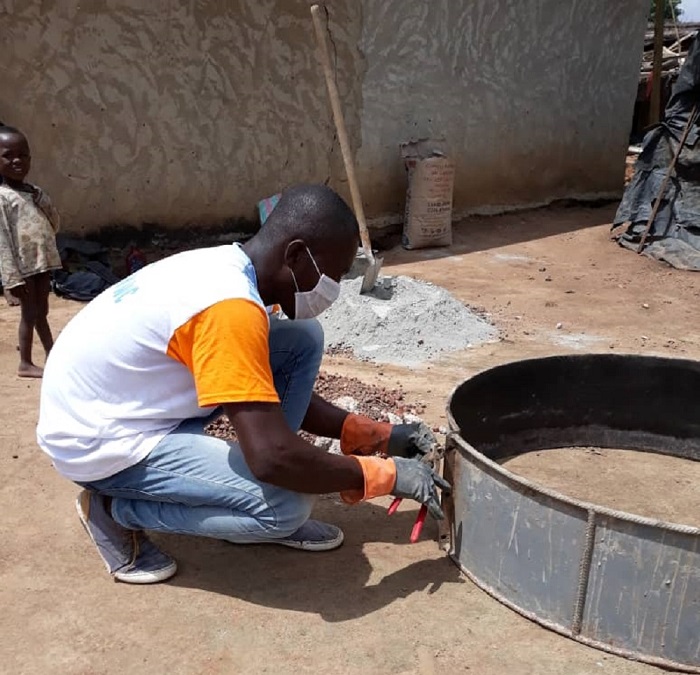 MrDjeahenp...uses.jpg
(Filesize: 152KB)
MrDjeahenp...uses.jpg
(Filesize: 152KB)
-
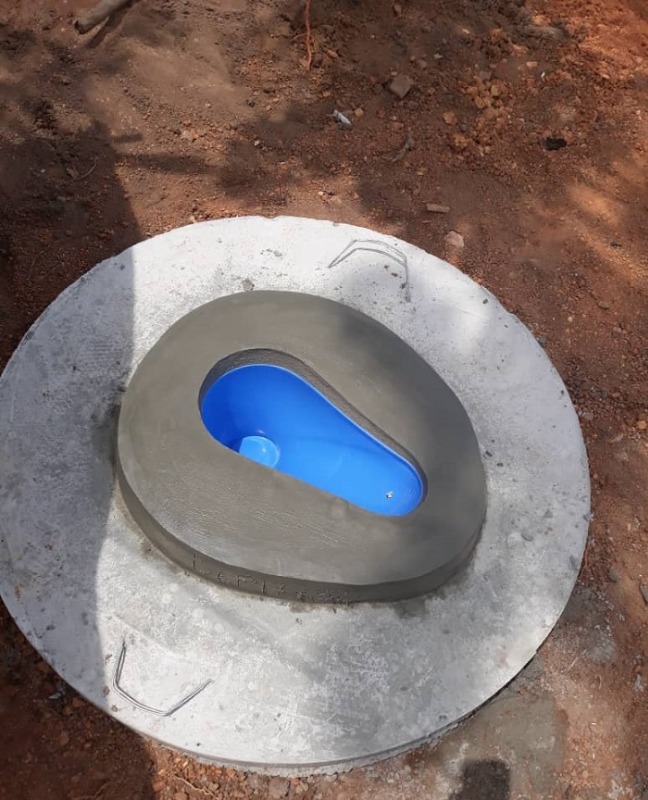 Miseenplac...opan.jpg
(Filesize: 142KB)
Miseenplac...opan.jpg
(Filesize: 142KB)
Please Log in to join the conversation.
You need to login to reply- USAIDssd
-

- SSD is a sanitation program funded by USAID, which aims to create sustainable sanitation market for the urban poor in Benin and Côte d'Ivoire. This market will elicit a demand for sanitation services and a reliable supply of high-quality sanitation products and services.
Less- Posts: 50
- Karma: 1
- Likes received: 9
Re: Sanitation Service Delivery - Bénin: Les micro-entrepreneurs rassurent de la fourniture des produits WC MIMIN aux ménages
Financé par l'Agence des États-Unis pour le développement international (USAID) depuis 2014, le programme de prestation de services d’assainissement en milieu urbain, Sanitation Service Delivery (SSD), forme et encourage les acteurs du secteur privé (maçons et claustratiers etc.) à fournir des prestations commerciales de produits et services d'assainissement abordables et de qualité aux ménages à faibles revenus résidant dans les zones urbaines et périurbaines. Mis en œuvre par le Population Services International
(PSI), le projet a formé et opérationnalisé trente-quatre 34 micro-entrepreneurs et 130 maçons pour la réalisation d’installations
d’assainissement dans 20 communes au Bénin sous le label « WC Mimin ». Il s’agit notamment des latrines à double fosse à usage alternatif, latrine améliorée à fosse unique et des pots de défécation.
Préoccupé par la continuité effective de la fourniture des produits WC MIMIN à la clôture du projet envisagée pour fin Septembre 2021, une délégation de l’USAID a rencontré le jeudi 25 Février 2021 les deux (02) micro entrepreneurs installés dans le département du Zou en faveur d’une visite de suivi des activités. A travers des échanges directs, ces artisans partenaires ont partagé avec ladite délégation, leur propre approche de démarchage des ménages ainsi que leur perspective.
En effet, les micro entrepreneurs mettent à contribution des agents de santé communautaires déjà rémunérés par certaines formations sanitaires et des conducteurs de taxi motos pour le démarchage des ménages. Ils proposent aux ménages visités/ clients les produits WC MIMIN moyennant une commission de 1000 à 3.000cfa selon le produit cédé. Ces revenus supplémentaires constituent une réelle motivation pour ces acteurs qui ne cessent de sensibiliser les potentiels consommateurs chaque fois qu’il est
nécessaire. Grâce à leurs actions sur le terrain, les micro entrepreneurs parviennent à installer quatre à cinq pots de défécation par jour. Ce qui contribue fortement au développement de leur business.
S’agissant de leur vision, les micro entrepreneurs s’engagent à multiplier les points de vente avancé au sein des endroits stratégiques de la localité cible. Le but de ces points de vente est de rapprocher plus les produits des consommateurs(ii), une des propositions de valeurs offertes par le modèle d’affaire WC MIMIN.
A leur tour la délégation a salué les formidables initiatives en cours de mise en œuvre par les micro entrepreneurs afin de
garantir la fourniture des produits WC MIMIN aux ménages à la clôture du projet. Cela augure ainsi de la pérennisation des prestations de ces derniers pour le bonheur des populations défavorisées.
Note: Translation added by Moderator (CSM) using www.DeepL.com/Translator
Funded by the United States Agency for International Development (USAID) since 2014, the Urban Sanitation Service Delivery (SSD) programme trains and encourages private sector actors (masons and clerks etc.) to provide commercial delivery of affordable and quality sanitation products and services to low-income households residing in urban and peri-urban areas. Implemented by Population Services International(PSI), the project trained and operationalised 34 micro-entrepreneurs and 130 masons to build sanitation facilities in 20 communes in Benin.in 20 communes in Benin under the label "WC Mimin". These include double pit latrines for alternative use, improved single pit latrines and defecation pots. Concerned about the effective continuity of the supply of MIMIN WC products at the end of the project envisaged for the end of September 2021, a USAID delegation met on Thursday 25 February 2021 with the two (02) micro entrepreneurs installed in the department of Zou for a follow-up visit of the activities. Through direct exchanges, these partner artisans shared with the delegation their own approach to canvassing households and their perspective. In fact, the microentrepreneurs use community health workers already paid by some health facilities and motorbike taxi drivers to canvass households. They offer WC MIMIN products to the households visited/clients for a commission of 1,000 to 3,000cfa depending on the product sold. This additional income is a real motivation for these actors, who constantly raise awareness among potential consumers whenever it isnecessary. Thanks to their actions in the field, the micro entrepreneurs manage to install four to five defecation pots per day. This contributes greatly to the development of their business.In terms of their vision, the microentrepreneurs are committed to multiplying the advanced sales points in strategic locations in the target locality. The aim of these outlets is to bring products closer to consumers(ii), one of the value propositions offered by the WC MIMIN business model.In turn, the delegation welcomed the great initiatives being implemented by the micro entrepreneurs toguarantee the supply of WC MIMIN products to households at the end of the project. This augurs well for the sustainability of their services for the benefit of the disadvantaged population.
(PSI), le projet a formé et opérationnalisé trente-quatre 34 micro-entrepreneurs et 130 maçons pour la réalisation d’installations
d’assainissement dans 20 communes au Bénin sous le label « WC Mimin ». Il s’agit notamment des latrines à double fosse à usage alternatif, latrine améliorée à fosse unique et des pots de défécation.
Préoccupé par la continuité effective de la fourniture des produits WC MIMIN à la clôture du projet envisagée pour fin Septembre 2021, une délégation de l’USAID a rencontré le jeudi 25 Février 2021 les deux (02) micro entrepreneurs installés dans le département du Zou en faveur d’une visite de suivi des activités. A travers des échanges directs, ces artisans partenaires ont partagé avec ladite délégation, leur propre approche de démarchage des ménages ainsi que leur perspective.
En effet, les micro entrepreneurs mettent à contribution des agents de santé communautaires déjà rémunérés par certaines formations sanitaires et des conducteurs de taxi motos pour le démarchage des ménages. Ils proposent aux ménages visités/ clients les produits WC MIMIN moyennant une commission de 1000 à 3.000cfa selon le produit cédé. Ces revenus supplémentaires constituent une réelle motivation pour ces acteurs qui ne cessent de sensibiliser les potentiels consommateurs chaque fois qu’il est
nécessaire. Grâce à leurs actions sur le terrain, les micro entrepreneurs parviennent à installer quatre à cinq pots de défécation par jour. Ce qui contribue fortement au développement de leur business.
S’agissant de leur vision, les micro entrepreneurs s’engagent à multiplier les points de vente avancé au sein des endroits stratégiques de la localité cible. Le but de ces points de vente est de rapprocher plus les produits des consommateurs(ii), une des propositions de valeurs offertes par le modèle d’affaire WC MIMIN.
A leur tour la délégation a salué les formidables initiatives en cours de mise en œuvre par les micro entrepreneurs afin de
garantir la fourniture des produits WC MIMIN aux ménages à la clôture du projet. Cela augure ainsi de la pérennisation des prestations de ces derniers pour le bonheur des populations défavorisées.
Note: Translation added by Moderator (CSM) using www.DeepL.com/Translator
Funded by the United States Agency for International Development (USAID) since 2014, the Urban Sanitation Service Delivery (SSD) programme trains and encourages private sector actors (masons and clerks etc.) to provide commercial delivery of affordable and quality sanitation products and services to low-income households residing in urban and peri-urban areas. Implemented by Population Services International(PSI), the project trained and operationalised 34 micro-entrepreneurs and 130 masons to build sanitation facilities in 20 communes in Benin.in 20 communes in Benin under the label "WC Mimin". These include double pit latrines for alternative use, improved single pit latrines and defecation pots. Concerned about the effective continuity of the supply of MIMIN WC products at the end of the project envisaged for the end of September 2021, a USAID delegation met on Thursday 25 February 2021 with the two (02) micro entrepreneurs installed in the department of Zou for a follow-up visit of the activities. Through direct exchanges, these partner artisans shared with the delegation their own approach to canvassing households and their perspective. In fact, the microentrepreneurs use community health workers already paid by some health facilities and motorbike taxi drivers to canvass households. They offer WC MIMIN products to the households visited/clients for a commission of 1,000 to 3,000cfa depending on the product sold. This additional income is a real motivation for these actors, who constantly raise awareness among potential consumers whenever it isnecessary. Thanks to their actions in the field, the micro entrepreneurs manage to install four to five defecation pots per day. This contributes greatly to the development of their business.In terms of their vision, the microentrepreneurs are committed to multiplying the advanced sales points in strategic locations in the target locality. The aim of these outlets is to bring products closer to consumers(ii), one of the value propositions offered by the WC MIMIN business model.In turn, the delegation welcomed the great initiatives being implemented by the micro entrepreneurs toguarantee the supply of WC MIMIN products to households at the end of the project. This augurs well for the sustainability of their services for the benefit of the disadvantaged population.
Learning and Communication Manager SSD|PSI Côte d’Ivoire
Attachments:
-
DSC_0452.JPG (Filesize: 227KB)
Please Log in to join the conversation.
You need to login to reply
Share this thread:
- Forum
- categories
- Markets, finance and governance
- Sanitation as a business and business models
- Progress so far ... Sanitation Service Delivery Program (PSI with PATH and WSUP, funded by USAID) - Ghana, Ivory Coast and Benin
Recently active users. Who else has been active?
Time to create page: 0.163 seconds







